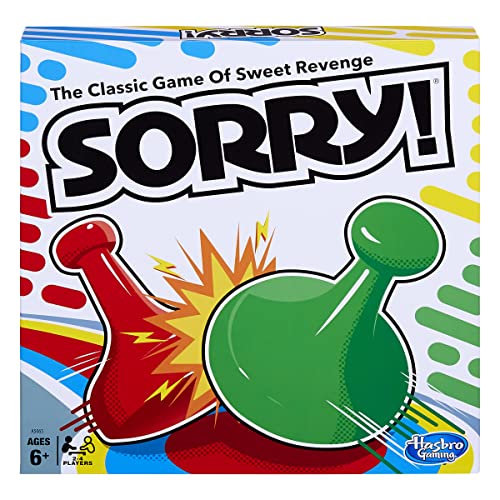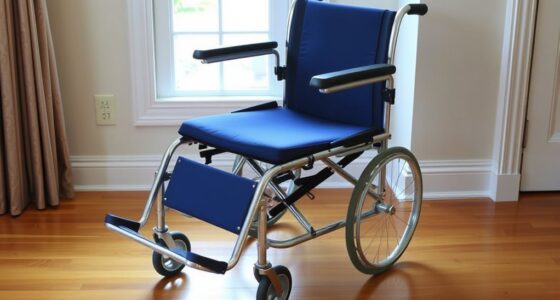If you’re looking for the best board games to bring joy and connection to elderly players, I suggest choosing options that are engaging, easy to handle, and promote social interaction. Think classic games like Connect 4, Sorry!, and Bingo, along with tactile and adjustable options like jumbo Tic Tac Toe designed for seniors or dementia-friendly puzzles. These games boost mental sharpness, encourage teamwork, and create memorable moments. Keep exploring to discover more games that can brighten any gathering.
Key Takeaways
- Choose games with large, tactile pieces and high-contrast visuals for easy handling and visibility.
- Include options that promote social interaction, teamwork, and friendly competition for meaningful connections.
- Select games with adjustable difficulty levels to accommodate varying cognitive and physical abilities.
- Favor classic, engaging activities like Tic Tac Toe, Connect 4, and word games that encourage multigenerational play.
- Prioritize durable, safe materials suitable for seniors with dexterity challenges or sensory sensitivities.
Jumbo Wooden Tic Tac Toe Game for Seniors and Dementia Activities
If you’re looking for a game that’s both engaging and tailored to seniors with cognitive impairments, the Jumbo Wooden Tic Tac Toe Game is an excellent choice. I love how it features a sturdy 6.5-inch wooden board with a removable grid, making setup simple and safe. The 7 red [O] and 7 blue [X] pieces are easy to handle, promoting tactile interaction. With two difficulty levels—beginner and intermediate—it adapts to different skill levels, encouraging problem-solving and mental engagement. This game not only stimulates cognition but also adds a vibrant, attractive element to any care environment. It’s a perfect blend of fun, therapy, and decorative appeal.
Best For: seniors with dementia, Alzheimer’s, stroke patients, or individuals with cognitive impairments seeking a safe, engaging, and stimulating game.
Pros:
- Durable, high-quality wood construction ensures longevity and resistance to damage.
- Adjustable difficulty levels promote cognitive engagement and problem-solving skills.
- Vibrant colors and safe, smooth surface enhance tactile interaction and visual appeal.
Cons:
- Larger size may require ample space for gameplay and storage.
- May need supervision for very advanced cognitive impairments to ensure correct usage.
- Limited to two-player interactions, which might restrict social engagement in some settings.
Hasbro Connect 4 Classic Game
The Hasbro Connect 4 Classic Game stands out as an excellent choice for elderly players who enjoy engaging, strategic fun without complex rules. It’s easy to learn and quick to set up, making it accessible for all skill levels. The game offers multiple ways to play, including a lively Frenzy mode and a pop-out feature that adds strategic depth. Its sleek, modern design with vibrant colors keeps players visually engaged. This game encourages friendly competition and strategic thinking, fostering connection and conversation. Perfect for family gatherings or solo play, it’s a timeless, versatile game that brings joy and mental stimulation to players of all ages.
Best For: players of all ages who enjoy engaging, strategic, and easy-to-learn tabletop games, including families, seniors, and casual gamers.
Pros:
- Easy to learn and quick to set up, making it accessible for players of all skill levels
- Multiple game modes, including Frenzy and pop-out features, offer variety and strategic depth
- Modern design with vibrant colors enhances visual appeal and keeps players engaged
Cons:
- May be less challenging for experienced strategic gamers seeking complex gameplay
- The game’s physical design might take up space, which could be a concern for limited areas
- As a primarily two-player game, it offers limited multiplayer options beyond one-on-one play
Sorry! Board Game for Kids Ages 6 and Up
is an excellent choice for kids aged 6 and up because its straightforward rules and engaging gameplay make it easy for young players to learn and enjoy. I love how the game combines sliding, colliding, and strategic card play, keeping kids engaged and thinking ahead. With four pawns per player, it offers plenty of opportunities for friendly competition and fun surprises, like sending opponents back to start. Its nostalgic feel and simple mechanics make it perfect for family game nights, helping children develop strategic skills while creating memorable moments. Sorry! is a timeless game that promotes connection and lively interaction for kids and families alike.
Best For: families with children aged 6 and up seeking a fun, easy-to-learn game that fosters strategic thinking and friendly competition.
Pros:
- Simple rules make it accessible for young children to learn and enjoy quickly.
- Encourages strategic planning and decision-making through dynamic gameplay.
- Promotes family bonding and nostalgic fun for players of all ages.
Cons:
- Can become repetitive after multiple plays due to similar gameplay scenarios.
- Competitive nature might lead to frustration for very young or highly competitive players.
- Limited complexity may not satisfy players seeking more challenging or advanced strategic options.
Joy for All Senior Word Games: Scrabble & Bingo for Elderly Adults
Joy for All Senior Word Games, including reimagined versions of Scrabble, Bingo, and Pass, stand out as excellent choices for seniors who enjoy mentally engaging activities that are easy to handle. These games combine nostalgic fun with innovative challenges, making them perfect for multigenerational play. They feature larger, easy-to-read letters and tiles, plus ergonomic components designed for low vision and dexterity issues. These games stimulate memory, strategic thinking, and mental agility—serving as effective brain exercises. With accessible design and comfortable gameplay, they promote mental sharpness and social connection, making them a valuable addition to any senior’s game collection.
Best For: seniors seeking engaging, accessible, and cognitively stimulating word games that can be enjoyed comfortably with family and friends.
Pros:
- Features large, easy-to-read letters and tiles for better visibility.
- Designed with ergonomic components suitable for low vision and dexterity challenges.
- Promotes mental agility, memory, and strategic thinking through fun gameplay.
Cons:
- May require initial familiarization due to new game formats.
- Limited to specific classic word and board games, possibly less variety for diverse interests.
- Physical components might still be challenging for extremely severe mobility issues.
Tic Tac Toe Board Game for Families
A Tic Tac Toe Board Game is an ideal choice for families seeking a simple yet engaging activity that encourages interaction across generations. Its compact size (15×15 cm) makes it perfect for travel, parties, or family gatherings. Made from eco-friendly resin plastic, it’s lightweight, waterproof, and durable. The colorful shapes boost kids’ cognitive skills, shaping and coloring while promoting hands-on learning. Suitable for ages 3 and up, it’s a fun way for parents and children to connect. Whether as a conversation starter or a casual game, it offers hours of social interaction, making it a versatile addition to family game nights.
Best For: families, parents with young children, and anyone looking for a portable, engaging game to enhance cognitive and social skills.
Pros:
- Made from eco-friendly, durable resin plastic that is lightweight and waterproof for easy portability.
- Bright, colorful shapes that stimulate children’s cognitive development and hands-on learning.
- Compact size (15×15 cm) ideal for travel, parties, and family gatherings, making it convenient to carry and store.
Cons:
- Limited complexity may not appeal to older children or adults seeking more challenging gameplay.
- The simple design might not hold the interest of those looking for a more strategic or advanced game.
- The petite size may be less suitable for larger hands or players who prefer bigger game pieces.
Easy Memory Games for Dementia Patients and Seniors
Easy memory games are an excellent choice for dementia patients and seniors because they combine simplicity with effective cognitive engagement. I love the wooden memory match board, which boosts skills like color awareness, logical thinking, and concentration. Its adjustable difficulty lets players challenge themselves by changing the number of colors, keeping the game fresh and stimulating. It’s perfect for groups, supporting 2-6 players, and encourages social interaction. The game also promotes fine motor skills and hand-eye coordination through picking and matching pieces. Overall, it’s a thoughtful gift that keeps minds sharp, provides hours of fun, and fosters connection among seniors and their loved ones.
Best For: seniors, dementia patients, and elderly adults seeking engaging, cognitive-boosting activities that promote social interaction and fine motor skills.
Pros:
- Adjustable difficulty levels keep the game challenging and engaging for all skill levels.
- Supports multiplayer play, encouraging social interaction and teamwork.
- Promotes cognitive skills, hand-eye coordination, and dexterity through simple matching tasks.
Cons:
- Might be too simple for users with advanced cognitive abilities seeking more complex games.
- Requires enough space and multiple players for group play, which may not always be feasible.
- Some users may need assistance with handling small pieces if they have limited fine motor control.
I should have known that! – A Trivia Game About Things You Oughta Know
If you’re looking for a lively, brain-boosting game that keeps everyone engaged, “I Should Have Known That!” is an excellent choice for casual gatherings or family game nights. This trivia game features over 400 questions across 110 cards, covering topics like geography, animals, and fairy tales. Instead of earning points for correct answers, players lose points for mistakes, making it exciting and fast-paced. Designed for 2 or more players aged 14 and up, it promises nonstop laughs, brain freezes, and some embarrassing moments. Compact and portable, it’s perfect for keeping minds sharp and conversations flowing during fun-filled evenings.
Best For: casual players, families, and party-goers looking for a fun, fast-paced trivia game that sparks laughter and lively conversation.
Pros:
- Engaging and humorous questions that keep players entertained
- No points for correct answers, adding a unique twist to traditional trivia
- Portable and compact design ideal for travel and gatherings
Cons:
- May be less suitable for very competitive players who prefer point-based scoring
- Limited to players aged 14 and up, excluding younger children
- Some questions might be too easy or too difficult depending on the players’ knowledge levels
Original SEQUENCE Game with Folding Board, Cards, and Chips by Jax
The Original SEQUENCE Game by Jax stands out as an excellent choice for families or groups seeking engaging, strategic gameplay that’s easy to learn yet challenging enough for all ages. With its folding board, cards, and chips, it offers a compact, portable fun experience. Players take turns playing cards and placing chips to form five in a row, aiming to complete a SEQUENCE before others. Suitable for 2-12 players aged 7 and up, it promotes strategic thinking and social interaction. Its simple rules make it accessible for children, while the depth keeps adults engaged, making it perfect for fostering fun and connection across generations.
Best For: families and groups of 2-12 players seeking a fun, strategic game that is easy to learn and suitable for ages 7 and up.
Pros:
- Promotes strategic thinking and social interaction across all ages
- Compact, portable design with folding board for easy storage and travel
- Suitable for a wide range of players, from children to adults, offering engaging gameplay for everyone
Cons:
- May be challenging for very young children under age 7 due to game complexity
- Requires multiple players for optimal fun, less suitable for solo play
- Playing time can vary depending on the number of players and skill levels, possibly leading to longer sessions
Alzheimers Memory Games and Dementia Activities for Seniors
For seniors with early-stage dementia or cognitive disabilities, Alzheimers memory games and activities offer a valuable way to stimulate the mind while enjoying social interaction. These games, made from premium solid wood with soft, noise-dampening felt, are easy to handle and designed to boost cognitive abilities. They encourage mental engagement by challenging basic math skills and enhancing focus. Suitable for 2-4 players, they also improve fine motor skills through tile flipping and hand-eye coordination. As a fun, logical activity, they promote mental stimulation, memory reinforcement, and overall well-being, making them an ideal gift for seniors and Alzheimer’s patients seeking meaningful engagement.
Best For: seniors with early-stage dementia or cognitive disabilities seeking engaging activities to improve mental and motor skills.
Pros:
- Made from premium solid wood with noise-dampening felt, ensuring durability and quiet play.
- Promotes cognitive enhancement, fine motor skills, and social interaction for elderly users.
- Suitable for 2-4 players, making it ideal for group activities in nursing homes or family gatherings.
Cons:
- May require supervision for initial learning, especially for users unfamiliar with game rules.
- Not electronic, so it may lack the variety of digital cognitive training tools.
- Limited to basic math and memory reinforcement, which might not satisfy users seeking advanced cognitive challenges.
Regal Games Reversible Wooden Board for Chess, Checkers & Tic-Tac-Toe
Designed with versatility in mind, the Regal Games Reversible Wooden Board is perfect for family game nights or gatherings, especially since it allows players of all ages to enjoy three classic games—checkers, chess, and Tic-Tac-Toe—on a single compact surface. Its 10.5-inch size makes it portable and ideal for travel, outdoor fun, or casual play. The set includes 24 checkers and 32 chess pieces, crafted from durable wood, ensuring long-lasting use. This game board promotes strategic thinking and problem-solving skills while encouraging social interaction, making it a wonderful addition to any family or group activity.
Best For: families, friends, and travelers seeking a versatile, educational, and portable game set for all ages to enjoy classic board games together.
Pros:
- Offers three popular games—checkers, chess, and Tic-Tac-Toe—in one compact set.
- Made from durable wood, ensuring long-lasting use and high-quality craftsmanship.
- Promotes strategic thinking, problem-solving, and social interaction for all age groups.
Cons:
- The 10.5-inch size may be too small for some players to comfortably manage multiple pieces at once.
- Limited number of checkers and chess pieces might restrict gameplay variations or larger matchups.
- Requires manual setup and arrangement, which may be inconvenient during quick or spontaneous play sessions.
Dementia Activity Puzzle Game for Seniors
A dementia activity puzzle game with 40 templates offers a versatile and engaging option for seniors facing cognitive challenges. I find this game perfect for stimulating thinking skills and boosting confidence. It features easy-to-handle, large wooden tiles in vibrant colors, designed to prevent hand strain and enhance finger dexterity. The game includes varying difficulty levels, from simple shapes to complex puzzles, keeping seniors challenged yet motivated. It’s ideal for use at home or in care settings, providing endless entertainment while supporting mental and physical well-being. This sensory-friendly activity helps slow cognitive decline and encourages focus, making it a valuable addition to any senior’s daily routine.
Best For: seniors with cognitive challenges seeking engaging, safe, and stimulating activities to support mental and physical well-being.
Pros:
- Promotes cognitive skills like shape recognition, color classification, and logical thinking.
- Large, smooth wooden pieces prevent hand strain and enhance finger dexterity.
- Suitable for various difficulty levels, providing ongoing motivation and entertainment.
Cons:
- May require supervision for some users to ensure correct puzzle assembly.
- Limited to one type of activity, which might necessitate additional entertainment options.
- Not explicitly labeled for dementia or Alzheimer’s, potentially requiring clarification for some buyers.
TDC Games Senior Moments Memory Game for Adults
The TDC Games Senior Moments Memory Game for Adults stands out as an engaging way to sharpen memory skills while having fun with loved ones. It features hundreds of zany lists designed to challenge your memory, like finding lost keys or recalling common items. Perfect for adults aged 40 and up, it makes a great gift for milestone birthdays, family gatherings, or holiday traditions. Suitable for two or more players, it encourages social interaction and lively conversations. Whether as a gift or a family activity, this game helps keep minds active while creating joyful moments with friends and family. It’s a fantastic addition to any game night.
Best For: adults aged 40 and above seeking a fun, engaging way to sharpen their memory skills while enjoying quality time with family and friends.
Pros:
- Encourages social interaction and lively conversations among players
- Suitable for various occasions like birthdays, holidays, and family gatherings
- Provides hundreds of zany, memory-challenging lists to keep minds active
Cons:
- May require multiple players for the full fun experience
- Some players might find the game less challenging if they have strong memory skills
- Not ideal for children or very young audiences due to its adult-oriented content
Jumbo Wooden Tic Tac Toe Game for Seniors and Dementia Activities
Jumbo Wooden Tic Tac Toe Game stands out as an excellent choice for seniors and individuals with cognitive impairments because of its high-quality construction and thoughtfully designed components. The set includes a sturdy wooden board, a removable grid, and brightly colored X and O pieces, making gameplay visually engaging and easy to handle. Its durable, smooth surface guarantees safe, tactile interaction, ideal for sensitive hands. With two difficulty levels and templates for guided play, it helps boost cognitive skills while providing fun. Perfect for therapy, companionship, or family activities, this game transforms simple moments into meaningful opportunities for mental stimulation and connection.
Best For: seniors, individuals with dementia or cognitive impairments, and those seeking engaging therapeutic activities to enhance mental stimulation.
Pros:
- Crafted from durable, high-quality wood ensuring long-lasting use and safety.
- Features vibrant colors and tactile components to enhance visual appeal and ease of handling.
- Includes multiple difficulty levels and templates to promote progressive cognitive challenges.
Cons:
- The set’s size may require dedicated space for optimal play.
- Some users might need initial guidance to utilize the templates effectively.
- Limited to Tic Tac Toe gameplay, which may not suit those seeking diverse game options.
Activities for Dementia Patients, 80 Pieces Wooden Tangrams Puzzle Game for Seniors
Designed specifically for seniors and dementia patients, the 80 Pieces Wooden Tangrams Puzzle Game offers an engaging way to stimulate the mind while promoting calmness and joy. Its colorful wooden tiles invite tactile exploration, making it a sensory delight that aids cognitive engagement. The included mat helps prevent mess and makes handling easier, while the 20 different templates cater to various skill levels, encouraging pattern recognition and logical thinking. Playing regularly can boost fine motor skills, improve focus, and support memory. It’s an enjoyable activity suitable for home or care settings, providing mental stimulation and emotional comfort for elderly users.
Best For: seniors and dementia patients seeking engaging, sensory, and cognitive activities to promote mental stimulation, calmness, and joy.
Pros:
- Promotes cognitive engagement, fine motor skills, and memory improvement through varied templates and colorful tiles.
- Made from durable, solid wood with vibrant hues, providing tactile and visual sensory stimulation.
- Suitable for use at home or in care facilities, offering an enjoyable activity that supports emotional well-being.
Cons:
- Not recommended for individuals with large hands due to the size of the tiles.
- Requires some supervision for those with advanced cognitive decline to ensure proper handling.
- The set may be less engaging for users who prefer digital or more complex activities.
Herd Mentality Family Board Game with Extra Questions
Herd Mentality Family Board Game with Extra Questions is an excellent choice for families and groups seeking lively, laughter-filled interactions. This game is perfect for 4 to 20 players, making it ideal for large gatherings or casual game nights. It’s easy to learn and quick to play, keeping everyone engaged. The game involves guessing what others are thinking, with hilarious results when your answer matches the majority or when you’re the odd one out and get the pink cow of doom. The 20 extra questions add variety, ensuring fun and memorable moments for players of all ages, especially during holiday celebrations or relaxed family evenings.
Best For: families and large groups seeking lively, humorous game nights with players aged 10 and up.
Pros:
- Easy to learn and quick to play, ideal for all ages and large gatherings
- Encourages social interaction and humorous guessing, enhancing group bonding
- Includes 20 extra questions for increased variety and replayability
Cons:
- May not appeal to players who prefer more strategic or complex games
- The humor and guessing mechanics might not suit very serious or competitive players
- Large group setup requires space and coordination, which can be challenging in small areas
Factors to Consider When Choosing Board Games for the Elderly

When choosing board games for the elderly, I consider factors like cognitive engagement, physical accessibility, and visual clarity to guarantee everyone can enjoy. It’s also important to look at social interaction opportunities and find a good balance of game complexity. These considerations help me select games that are fun, inclusive, and suitable for different needs.
Cognitive Engagement Levels
Choosing the right board game for elderly players involves considering how it challenges their cognitive skills without causing frustration. I look for games that promote problem-solving and strategic thinking, as these help maintain and improve cognitive functions. Games with adjustable difficulty levels are ideal because they can be tailored to different mental abilities and adapted as players progress. Interactive puzzles and matching games are excellent choices, as they stimulate memory, attention, and pattern recognition—key for cognitive health. It’s also important that the complexity of the rules matches the players’ abilities to prevent confusion and keep them engaged. Incorporating visual and tactile elements further supports cognitive processing and motor coordination, making the game both stimulating and accessible.
Physical Accessibility Needs
To guarantee that elderly players can fully enjoy board games, it’s vital to take into account their physical accessibility needs. I recommend choosing games with large, easy-to-grasp pieces to accommodate limited dexterity or arthritis. Smooth, rounded edges and non-toxic finishes ensure safety and comfort during handling. Using contrasting colors and clear visuals helps players with low vision distinguish game elements easily. Additionally, consider the weight and stability of components to prevent tipping and make placement easier. Opt for games that don’t require fine motor skills or complex movements, making participation more accessible for those with physical limitations. By selecting games with these features, you create an inclusive environment that encourages everyone to engage and have fun without frustration or discomfort.
Visual Clarity Features
Ensuring good visual clarity is essential for elderly players to enjoy board games fully. High-contrast colors and bold fonts make it easier for those with low vision or visual impairments to distinguish game elements. Large game pieces and legible text help players quickly identify and interact with components without strain. Minimal clutter and simple designs reduce visual confusion, allowing players to focus on the game rather than deciphering complex visuals. Proper lighting and anti-glare surfaces can further enhance visibility, preventing eye strain during extended play. Incorporating visual cues such as symbols or color coding speeds up recognition and understanding, making gameplay smoother. Prioritizing these features guarantees that everyone can participate comfortably and confidently, fostering a more inclusive and engaging gaming experience.
Social Interaction Opportunities
When selecting board games for elderly players, fostering social interaction can make a significant difference in their overall enjoyment and well-being. Games that encourage group play help strengthen bonds and improve communication skills. Choosing games with simple rules and clear instructions guarantees everyone can participate comfortably, especially those with cognitive or sensory challenges. Cooperative or team-based games promote a sense of community, reducing feelings of loneliness. Interactive games that involve verbal exchanges or storytelling can boost social engagement and emotional health. Additionally, selecting games that invite players to share opinions or memories not only enhances social connections but also supports cognitive function. Prioritizing these social interaction opportunities creates a more inclusive, enjoyable experience for elderly players.
Game Complexity Balance
Choosing the right board game for elderly players involves finding a balance in complexity that keeps everyone engaged without causing frustration. I recommend selecting games with simple rules and clear instructions to make understanding easy and reduce confusion. It’s helpful to offer varying difficulty levels or adjustable challenges to suit different cognitive and physical abilities. Avoid overly intricate strategies or fast-paced mechanics that might overwhelm or tire seniors. Incorporating familiar themes or classic gameplay can boost comfort and enjoyment without a steep learning curve. Also, consider the game’s cognitive load—aim for something that stimulates mental activity but doesn’t cause cognitive overload or frustration. Striking this balance ensures the game remains fun, accessible, and engaging for everyone involved.
Safety and Durability
Selecting safe and durable board games for elderly players requires careful attention to materials and design. I recommend choosing games with non-toxic, BPA-free components to prevent health risks during handling. Sturdy materials like solid wood or high-quality plastics are ideal, as they resist breaking or warping over time. Look for games with rounded edges and smooth surfaces to minimize cuts, splinters, or skin irritation. It’s also important to select games featuring large, easy-to-handle pieces that accommodate limited dexterity or arthritis. Additionally, secure, stable bases and non-slip surfaces help prevent tipping and accidental spills during play. These considerations ensure the game remains safe, functional, and enjoyable for elderly players, promoting a worry-free gaming experience.
Age-Appropriate Content
Ensuring that board game content and themes are appropriate for elderly players is essential for maintaining their comfort and engagement. I recommend choosing games with content that resonates positively and avoids any themes that could cause discomfort or confusion. It’s important to select games with difficulty levels that match their cognitive and motor skills, steering clear of overly complex or too simple options. Clear, large print and simple instructions help those with visual or cognitive limitations participate comfortably. Additionally, I advise avoiding games with language, imagery, or themes that are inappropriate or potentially upsetting. The overall tone of the game should promote fun and positive interaction, fostering connection without risking discomfort from sensitive or unsuitable material. This thoughtful approach ensures everyone enjoys the experience.
Frequently Asked Questions
How Do I Choose Age-Appropriate Board Games for Seniors?
When choosing age-appropriate board games for seniors, I focus on simplicity and engagement. I look for games with clear rules, larger pieces, and gentle challenges that suit their cognitive and physical abilities. I also consider their interests and past experiences to make certain the game feels familiar and fun. Most importantly, I pick games that encourage social interaction, making sure everyone can participate comfortably and enjoy the experience.
What Safety Features Should I Look for in Senior Board Games?
When choosing senior board games, I look for safety features that put my mind at ease, like large, easy-to-handle pieces to prevent choking or frustration. Non-slip bases keep the game stable, while rounded edges on pieces avoid any accidental pokes. I also check for clear, high-contrast visuals to reduce eye strain. Think of these features as a safety net, ensuring everyone can enjoy the game worry-free and focus on fun.
Are There Multiplayer Options Suitable for Elderly Players?
Yes, there are plenty of multiplayer options perfect for elderly players. I recommend games like Mahjong, which encourages social interaction, or classic card games like Rummy and Crazy Eights that are easy to learn. These games promote fun and connection, and many have simple rules that accommodate different skill levels. Playing together not only entertains but also helps keep the mind sharp and fosters meaningful relationships.
How Can Board Games Help Improve Cognitive Health in Seniors?
Research shows that playing board games can boost cognitive health in seniors by enhancing memory, problem-solving skills, and mental agility. I’ve personally seen how engaging in games like chess or Scrabble keeps my mind sharp and helps delay cognitive decline. These activities also stimulate social interaction, which is essential for mental well-being. So, I believe incorporating regular game time is an enjoyable way to support cognitive vitality in older adults.
What Are Affordable Options for Quality Senior-Friendly Board Games?
If you’re looking for affordable, quality senior-friendly board games, I recommend classics like Scrabble, Connect 4, and Sorry! These games are budget-friendly, easy to learn, and promote social interaction. You can find them at most toy stores or online marketplaces like Amazon or eBay. I’ve found that these options offer great value and endless fun, helping seniors stay engaged and connected without breaking the bank.
Conclusion
Just like a sturdy bridge connects hearts across distances, choosing the right game can build bridges of joy and connection. These games are more than just fun—they’re pathways to laughter, memories, and companionship. So, pick one that sparks a smile, and watch as your loved ones sail smoothly into moments of shared happiness. After all, every game is a small boat carrying us closer to each other’s hearts.

























